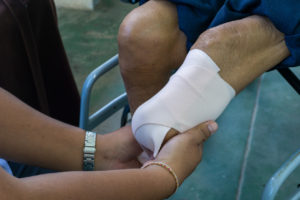Amputation Injury

Traumatic amputation can happen in almost any accident. You could suffer from a mangled limb after a motorcycle accident. Or, you might need to have a breast surgically removed due to a tumor caused by exposure to toxins at work.
Amputation can leave you physically and mentally traumatized. You could require medical treatment, physical therapy, counseling, prosthetics, and modifications to your home as a result of your loss.
Your expenses after amputation could be overwhelming unless you obtain compensation from the person or business responsible for your injuries.
Here are the things you should know about amputation injuries and the effect that an amputation could have on an injury claim.
Table of Contents
How Do Amputation Injuries Happen?
Amputation injuries can arise from trauma or disease. The most common reason for amputation of the lower limbs is disease, including diabetes, vascular disease, and cancer. Conversely, 75% of amputations in the upper limbs result from trauma.
You are most likely to injure your arms in workplace accidents, particularly those involving power tools and factory machines.
You instinctively use your arms to protect yourself during an accident. As a result, your arms could suffer injuries while attempting to prevent an injury to your head, face, or neck.
Traumatic amputations can occur when trauma tears a body part away. This usually happens when an object cuts through a limb or a force pulls the limb apart at a joint. For example, a workplace accident involving machinery or power tools could remove a finger by cutting through it or pulling it off the hand.
Traumatic amputations can also happen when trauma causes so much damage to a body part that doctors recommend amputation. This might happen when the blood vessels, muscles, or nerves in a limb sustain so much damage that doctors cannot restore normal function to the limb.
It can also happen when an accident shatters a bone so badly that doctors cannot reconstruct it.
What Are the Risk Factors for Amputation Injuries?
Many types of accidents can result in traumatic amputation. Additionally, exposure to toxins in the workplace can increase the risk of amputation due to disease. Some events that increase the risk of amputation injuries include:
Car Accidents
Car accidents involve a lot of force. This force can mangle metal and shatter glass. A crash could trap a limb, damaging it so severely that doctors must amputate it.
Workplace Accidents
Workplaces can involve dangerous conditions that produce injuries requiring amputation, including:
- Crushing injuries
- Blast injuries
- Injuries from falling objects
- Chopping and cutting injuries
A trapped body part might require amputation in order to free you. For example, a factory machine might not have a setting to reverse a feeder to release a trapped limb. As a result, rescuers might need to perform an emergency amputation to free you from being trapped in the machine.
Workplaces can also expose you to toxins or caustic chemicals. Caustic chemicals can cause severe burns that require amputation. Toxins can cause chronic diseases or cancers that might necessitate amputation, as well.
Bicycle and Pedestrian Accidents
Bicycle accidents and pedestrian accidents can produce devastating injuries.
When a vehicle strikes a cyclist or pedestrian, the victims can shatter bones and tear flesh. The resulting injuries could require amputation.
How Are Amputation Injuries Treated?
Doctors follow a certain procedure to amputate a damaged body part:
- Remove damaged or diseased tissue
- Close blood vessels
- Prepare a stump that can accept a prosthesis
- Insert a drain
- Dress the skin flaps over the stump
In some cases, the doctor may leave the skin flaps unsutured. This allows the doctor to remove more tissue if necessary. It also allows the doctor access to the wound if it becomes infected. In other cases, the doctor may close the skin flaps.
What Are the Different Types of Amputations?
Doctors choose the location for amputation by balancing the need to remove the damaged or diseased tissue with the desire to leave as much tissue as possible for a prosthesis.
Some common amputations include:
- Toe
- Foot at the ankle
- Foot above the ankle
- Leg below the knee
- Leg through or above the knee
- Leg at the hip
- Finger
- Hand at the wrist
- Arm below the elbow
- Arm through or above the elbow
- Arm at the shoulder
Amputations also include the removal of other body parts besides limbs, such as a breast or an ear.
What Are the Effects of Amputations?
Amputations can lead to physical and mental effects. In the short term, amputations can lead to infection. If an infection takes hold in a stump, the doctor might need to remove more tissue.
Over the long term, amputations can lead to:
Phantom Limb
Phantom limb is not psychological. The brain has a map of the nerves in the body. When the doctor severs the nerves during an amputation, the brain’s map becomes outdated.
As a result, you might have sensations where your amputated body part was removed. These sensations include:
- Pain
- Tingling
- Hot or cold
- Tickling
Over time, the brain will update its map and these sensations will disappear.
Depression and Anxiety
Many amputees experience depression. According to one study, about 40% of amputees experience anxiety, and about 20% experience depression.
Coping with anxiety and depression after a traumatic amputation might require therapy and counseling. Losing a limb might trigger a grief response. You might need to process that grief to regain normalcy in your emotional and mental state.
What Kind of Compensation Can I Recover for Amputation Injuries?
When you lose a body part, you have suffered a permanent injury. Even if doctors can fit you with a prosthesis, you can never regain the function of your actual body part.
This means that you may be entitled to large compensation for your amputation injury. A damage claim will include your medical expenses, your lost income, and your pain and suffering.
The medical expenses for treating an amputation tend to be large. You might also lose months of income while you recover from your injuries. Equally importantly, your earning capacity might significantly diminish after you lose a limb or other body part.
Finally, your damage claim should include your physical pain and mental anguish. After an amputation, these non-economic damages could be substantial.
Contact a New York City Personal Injury Lawyer for Help
To discuss your amputation injury or the compensation you could recover, contact our attorneys. We’ll review your case during a free consultation and help you to determine your legal options. Our New York City personal injury lawyer is standing by.
Visit Our Law Office In Manhattan, NY
Rosenbaum & Rosenbaum, P.C.
100 Wall St 15th Floor, New York, NY 10005
(212) 514-5007

